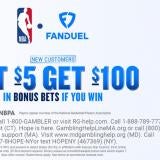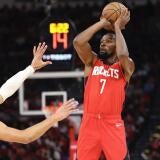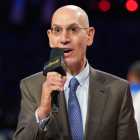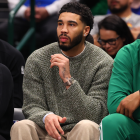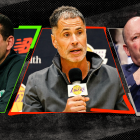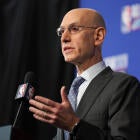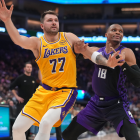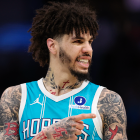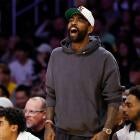NBA trade deadline 2020 winners and losers: Clippers add depth with Morris; Warriors give Wiggins fresh start
Clint Capela and Andre Iguodala are big winners on deadline day as are the Clippers and Heat.
The NBA's version of musical chairs is over and … Shabazz Napier is a Washington Wizard. Dang, I was just getting used to him being a Denver Nugget.
OK, that isn't the biggest news following the 3 p.m. ET trade deadline, but if you can't get your Morrises and Hernangomezes straight, it's worth looking at our trade tracker. What follows is a broad overview of the deadline deals, in which I attempt to way-too-prematurely declare the winners and losers of the day. Let's start with the positive stuff.
Winner: Clint Capela
Over the past few years, the Rockets have drifted away from pick-and-roll sets, marginalizing Capela slowly and then all at once. It was clear in the games leading up to this trade that they thought they were better without a non-shooting center, and the rationale is particularly understandable now that Russell Westbrook is on the roster. From Capela's perspective, this is the rare time when going from a fringe contender to a rebuilding team is unequivocally a step up.
The Hawks' entire system is based on Trae Young running high pick-and-rolls, and Capela will now get to play the role he's best at, with a young and ridiculously skilled point guard spoonfeeding him dunks and layups. It's like a new Lob City!
Loser: Andre Drummond
Oh man:
If there’s one thing I learned about the NBA, there’s no friends or loyalty. I’ve given my heart and soul to the Pistons , and to be have this happen with no heads up makes me realize even more that this is just a business! I love you Detroit...
— Andre Drummond (@AndreDrummond) February 6, 2020
It can't feel great to be salary-dumped for a second-round pick two years after being named to his second All-Star team. Drummond's game is divisive, especially for a max player, but the Pistons punting on even dealing with his player option this summer is a bit of a shock. This kind of thing isn't supposed to happen to a 26-year-old as talented as he is, and Drummond is now going from a bad situation to an arguably worse one, with a difficult decision to make.
Option 1: Drummond can pick up his $28.8 million option for 2020-21 and sign up for another year with a team that is years away from being even close to relevant.
Option 2: Drummond can decline the option and enter free agency this July, when the teams that project to have max cap space are:
- Atlanta, which just traded for Capela
- Miami, which employs Adebayo
- New York, which employs Mitchell Robinson
- Memphis, which employs Jonas Valanciunas and will probably just roll with Jaren Jackson Jr. and Brandon Clarke in the frontcourt eventually
- Detroit, which just traded Drummond for a second-round pick
- Cleveland, which just traded for him
- Charlotte, which might have interest and makes some sense, but could be essentially bidding against itself (if the front office doesn't decide it would rather hold out for a better defender or simply avoid making a big investment in a traditional center)
What a strange place he is in.
Winner: The positional revolution
Shoutout to FreeDarko. Houston didn't even keep Jordan Bell, and I half-expected it to dramatically waive Tyson Chandler and Isaiah Hartenstein and add a SMALLBALL patch to its jerseys. The 6-foot-5 P.J. Tucker is the Rockets' starting center, and while I'm curious to see what they do with their open roster spots in the buyout market, it's clear that the 6-foot-7 Robert Covington, the 6-foot-6 Thabo Sefolosha and the 6-foot-6 Danuel House will all spend time being their tallest player on the court.
"Pretty straight forward," Daryl Morey said, via the Houston Chronicle's Jonathan Feigen. "The best way to play with our stars that we feel is the one that gives us the best chance to win the championship is with a stretch four, playing up-tempo, shooting and wing defenders
I have no idea if this is going to work to the point where Morey and Mike D'Antoni keep their jobs beyond this season, but I admire the courage of their convictions and I love anything that riles up traditionalists. Let's get super weird.
Loser: Meh-mphis!
I like Justise Winslow. He has always been a strong and versatile defender, even starting at center in the playoffs as a rookie. Last season, the Heat empowered him to play point guard, and he took full advantage, showing off a broader skill set and more confidence in his shot than ever before. If Memphis gets that guy, I'll be even more excited about its future, which I didn't think was possible.
The value proposition isn't great, though. Winslow's shooting was terrible in the 11 games he played this season, and it took on not one but two onerous contracts to swap Iguodala for him. That feels like an overpay, although I am intrigued by Gorgui Dieng based on how he played (and more specifically how he shot) when Towns was hurt this season.
Winner: Miami's creative geniuses
I admit that I'm a bit disappointed that the Heat couldn't get Danilo Gallinari, but I'm still kind of flabbergasted that they were able to do what they did. Miami had plenty of competition for Andre Iguodala, and it managed not only to get him but to shed $28.7 million in salary owed to Dion Waiters and James Johnson next season. I can't wait to see teams try to score against Bam Adebayo, Jimmy Butler and Iguodala in the playoffs, and I anticipate that the Heat will be even better next season, setting themselves up to pitch 2021 free agents from a position of strength.
Loser: John Collins
I get why the Hawks wanted to get a center to play next to Collins -- defense is a thing -- but I wish they had found a way to get a floor-spacing one. The optimistic spin on Collins playing next to Capela is that it will force the 22-year-old to expand his game, which he was in the process of doing anyway. In the immediate future, though, it's an awkward fit, and there's no way to get around the fact that Collins will spend less time playing the two-man game with Young.
Winner: The Los Angeles team that got Morris
The Clippers and Lakers were both among the teams that wanted to take Marcus Morris from the Knicks, and the Clippers notched another win over their rivals. Credit them for having the foresight to keep their 2020 first-round pick out of the Paul George deal last summer, which gave the Morris deal a simple, obvious structure. Morris might be a slight downgrade from Moe Harkless defensively, but he gave the Celtics good minutes against LeBron James in the playoffs and he's a much more effective offensive player. Unlike Harkless, Morris can punish teams for switching smaller defenders onto him or leaving him open on the perimeter.
Loser: The Los Angeles team that didn't get Morris
The Lakers have a championship-caliber team, and it sounds like they'll add Darren Collison or some other veteran in the relatively near future. They didn't have to do anything. It's a bit of a bummer, though, that they lost the Morris sweepstakes to the Clippers and couldn't find a Kyle Kuzma trade they were comfortable with, as difficult as those tasks may have been.
Winner: Iguodala and his Iguodollars
The 36-year-got to rest up for more than half the season, and he now has a chance to compete in the East with a dangerous team. Iguodala would have been a deadline-day winner even without the contract extension (for $15 million next season, with a $15 million player option the following season that the Heat have reportedly pledged to pick up if they strike out in free agency), simply because he gets to play for another top-notch coach with a significant but not especially taxing role. The extension just reinforces the fact that he played this whole situation perfectly.
Loser: The Warriors, retroactively
It doesn't feel right to call Golden State a loser of this trade deadline, but I needed a way to emphasize that its 2019 offseason looks different now. The Warriors gave up a first-round pick to dump Iguodala's contract, setting up their sign-and-trade for Russell. Adding Russell meant hard-capping themselves, so they have had limited roster flexibility ever since. The second-round picks they got for Willie Cauley-Stein, Alec Burks and Glenn Robinson III are helpful, but I'm not sure that Wiggins and a first-round pick is the return they had in mind for Russell --the pick is great; Wiggins is an enormous risk.
Winner: Wiggins the Warrior
The Timberwolves have been various shades of bad throughout Wiggins' six-year career, and perhaps he needs a fresh start. After a promising stretch in November, it seemed like he might be playing himself out of town, but his contract once again looked untradeable when his efficiency declined and Minnesota fell apart. That he was moved to Golden State of all places is somewhat shocking, and the organization has every incentive to invest in his development. If Wiggins is going to be the player he can be, this is the place to do it. I don't know how he'll fit in Steve Kerr's offense, but I am certain that he'll have plenty of space playing next to the Splash Brothers next season.
Loser: Philadelphia, despite making a good trade
I don't like binary thinking, and the Sixers' trade deadline can't neatly be put into either box here. That they have wound up in my group of deadline losers is a reflection of the fact their roster is still messy, as they elected not to give it a major shakeup, and the fact that it feels wrong to praise them effusively for correcting a self-inflicted problem. Trading for Alec Burks and Glenn Robinson III was smart -- both fit with Philly's stars, and the price wasn't too high. They both signed minimum contracts with the Warriors last summer, though, and if the Sixers had signed them (or players like them) rather than stacking the roster with bigs, they wouldn't have had to do this.
Winner: Karl-Anthony Towns
Minnesota traded his best friend on the team, but then acquired one of his best friends in the world. The Wolves' thirst for D'Angelo Russell has been the worst-kept secret in the NBA for what feels like forever, and they finally got it done. From an allocation-of-resources standpoint, I'm not sure Russell on a max contract is worth giving up the pick they sent to the Warriors, but ending the KAT-Wiggins era and starting this new one will unquestionably please Towns. Now let's see how they play together.
Loser: Meh-nnesota!
The Wolves got their man, but at what cost? I'm interested in seeing Russell and Towns' pick-and-roll chemistry on offense, but I shudder when I think about the other side of the court. Given how much money Russell and Wiggins make, the pick they sent to Golden State could be the most valuable and important part of this deal. Minnesota's front office still has a steep hill to climb.
Winner: Dewayne Dedmon
Dedmon joins Trevor Ariza (and George Hill a couple of years ago) in the signed-with-the-Kings-and-got-traded-months-later club. Capela's presence means he won't start in Atlanta, but there are worse fates in life than being a backup on a three-year, $40 million contract. More than that, though, Dedmon is returning to a locker room in which he was popular and a coaching staff that got the most out of him on the court.
Loser: Meh-waukee!
I wanted the Bucks to do something, despite their record and their chemistry. An extra playmaker would have been nice. A lights-out shooter would have been, too. Milwaukee might win a title and make this criticism look stupid, but I can't help but feel like it got too comfortable.




